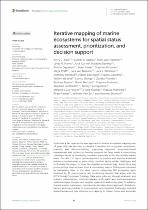| dc.contributor.author | Sink, Kerry J. | |
| dc.contributor.author | Adams, Luther A. | |
| dc.contributor.author | Makwela, Mapula | |
| dc.date.accessioned | 2023-05-03T10:36:50Z | |
| dc.date.available | 2023-05-03T10:36:50Z | |
| dc.date.issued | 2023 | |
| dc.identifier.citation | Sink, K. J. et al. (2023). Iterative mapping of marine ecosystems for spatial status assessment, prioritization, and decision support. Frontiers in Ecology and Evolution, 11, 1108118. https://doi.org/10.3389/fevo.2023.1108118 | en_US |
| dc.identifier.issn | 2296-701X | |
| dc.identifier.uri | https://doi.org/10.3389/fevo.2023.1108118 | |
| dc.identifier.uri | http://hdl.handle.net/10566/8889 | |
| dc.description.abstract | South Africa has taken an iterative approach to marine ecosystem mapping over
18 years that has provided a valuable foundation for ecosystem assessment,
planning and decision-making, supporting improved ecosystem-based
management and protection. Iterative progress has been made in overcoming
challenges faced by developing countries, especially in the inaccessible marine
realm. Our aim is to report on the approach to produce and improve a national
marine ecosystem map to guide other countries facing similar challenges, and
to illustrate the impact of even the simplest ecosystem map. South Africa has
produced four map versions, from a rudimentary map of 34 biozones informed
by bathymetry data, to the latest version comprising 163 ecosystem types
informed by 83 environmental and biodiversity datasets that aligns with the
IUCN Global Ecosystem Typology. | en_US |
| dc.language.iso | en | en_US |
| dc.publisher | Frontiers Media | en_US |
| dc.subject | Ecosystem | en_US |
| dc.subject | Biodiversity | en_US |
| dc.subject | Ecology | en_US |
| dc.subject | Conservation | en_US |
| dc.subject | Marine ecosystem | en_US |
| dc.title | Iterative mapping of marine ecosystems for spatial status assessment, prioritization, and decision support | en_US |
| dc.type | Article | en_US |

